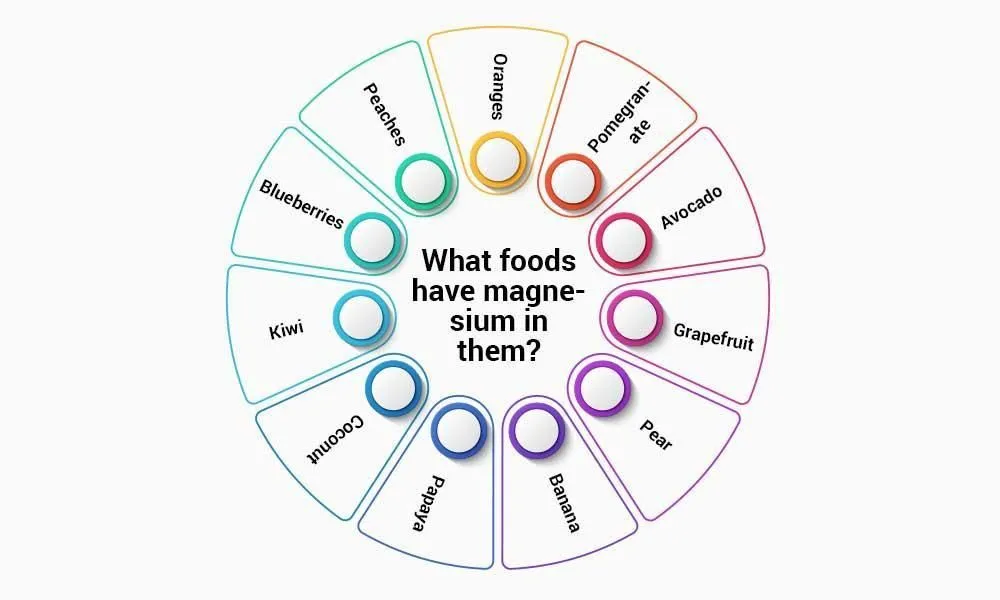Magnesium is the 12th most abundant element by mass in the human body. It maintains coordination in the digestive system and metabolism, and thus affects weight loss directly. It also powers cell formation and enzyme synthesis to help the nervous system work efficiently. Its deficiency may cause abnormal nerve excitation and blood vessel spasm, causing a serious health risk.
It is easy to address the issue by consuming foods that are rich in magnesium and the good thing is that most fruits can help you get that done. You can have your fill and boost the levels of this natural element in your body. The same would also help you in various routine activities like melting some belly fat and normalizing your blood pressure.
Magnesium is a mineral that’s naturally found in the body and is also present in our daily diet. It can also be found in supplements and medicines like antacids and laxatives. It stimulates biochemical reactions in the nervous and digestive systems.
This powerful mineral also supports nerve functions, regulates blood pressure, stimulates protein synthesis, and helps in controlling blood glucose levels. All these factors help in better metabolism. Magnesium is also crucial for the maintenance of the physical structure and creating the DNA. Without this mineral, calcium and potassium ions cannot be transported through the cell’s membranes. This affects a person’s motor control like muscle contraction, impulse conduction, and normal heart rhythm.
Here’s why you need magnesium in your bloodstream and bones:
Increases immunity
Maintain blood sugar and blood pressure levels
Reduces inflammation
Boosts strength
Strengthens digestive system
Prevents spasms and aches
Dissolve blood clots
Improves mood
Increases muscular strength
Has therapeutic uses
Resists the onset of Type 2 diabetes
Improves biochemical processes
Reduces risks of kidney-related diseases
Improves eyesight
Also read: A deficiency of magnesium is conclusively linked to irregular weight distribution. This may lead you to weight gain or weight loss when you least want it. You may note that this element is usually difficult to detect because it is mostly found in bone and cells.
A medical professional can tell you about high or low magnesium levels by assessing your blood serum levels through a blood test. Normal serum concentrations range between 0.75 and 0.95 millimoles per liter.
You may note that about 30% to 40% of dietary magnesium consumed is absorbed by the body, and only its traces are found in the blood serum.
Here are some other symptoms of magnesium deficiency:
Loss of appetite
Nausea
Vomiting
Headache
Weakness
Upset stomach
Low blood pressure and blood sugar levels
Seizures
Muscular weakness and cramps
Coronary spasms
Personality Disorder
Coronary Spasms
Numbness and tingling in nerves
Shaking
May cause low levels of calcium and zinc
A deficiency of magnesium in your bloodstream can severely affect your wellbeing in ways more than one. It can trigger, if not cause, the following health issues:
Along with mood swings, PMS can cause symptoms such as heavy abdominal cramping, fatigue, and water retention. By eating magnesium-rich foods, you can improve your general mood along with reducing bloating and stomach cramps. You can also go to your local health store for dietary supplements containing this mineral.
It can be prevented or helped by consuming magnesium. The most common causes of diabetes are the result of insulin resistance. Magnesium may effectively stop or reduce insulin resistance and bring blood sugar levels to normal levels.
People who suffer from migraines have lower levels of magnesium than those who do not. It can have a tremendous effect in reducing migraines or stopping them in their tracks. We also recommend staying away from gluten-rich foods to contain this issue.
You may choose to derive your quota of this natural element through organic produce like fruits and vegetables. They can take you closer to your daily dietary requirement with no side effects. You may also choose to go with some of the best magnesium supplements for the same effect, but you should ask a virtual healthcare professional about it first.
With magnesium being a vital part of your body’s function, what can you eat to keep your levels at a normal ratio, and what may happen when your body is deprived of this important mineral?
Hypomagnesemia is a crucial health condition defined by magnesium levels less than 0.75mmol/L. One of the easiest ways to help raise its deficiency is to eat foods rich in magnesium. Magnesium is also found in plant and animal foods- the former may include green leafy vegetables such as spinach, nuts, whole grains, legumes, and seeds.
Foods that are rich in dietary fiber are also a good source of magnesium. If you need this mineral, stay away from processed foods, as the process in which they remove the nutrient-rich germ and bran can substantially lower its strength and percentage.
Did you know? Drinking less than six liters of water every day could also lead to a deficiency of magnesium in your body.
Certain fruits are high in fiber and pectin that are natural fat burners and they also help to boost up metabolism levels. We are presenting a list of foods that help in weight loss, are good for health, and can also boost up energy levels because they contain a good amount of magnesium.
Avocado is loaded with healthy fats, particularly monounsaturated oleic acid. It is high in fats but also contains a lot of water, the latter keeps you full for longer durations without the intake of excessive calories. This fruit is also rich in fiber and potassium.
Nutritional info: 1.2 oz of avocado has 54 kcal calories, 5g fats, 7g fiber, and 1 g proteins.
One fruit that needs to be highlighted in this list is grapefruit because of its direct impact on belly fat. In a study of 91 obese individuals, consumption of fresh grapefruit resulted in a weight loss of 3.5 pounds (1.6 kg) over 12 weeks. It also increases insulin resistance, a metabolic abnormality that is responsible for many chronic diseases.
Nutritional info: 0.5 grapefruit - Calories 52, Carbs 13g, Fiber 2g, Protein 1g, and Sugars 8g.
The United States Department of Agriculture (USDA) recognizes pear as a fruit with a high amount of pectin fiber. This fiber decreases blood sugar levels and helps you avoid between-meal snacking. The same is also supported by a Brazilian study conducted over 12 weeks.
This study highlighted that overweight women, who ate three small pears, lost more weight in comparison to those who didn't. This fruit also lowers cholesterol due to its high potassium content.
Nutritional info: 1 cup sliced - Calories 80, Fat 0.2g, Carbs 21.3g, Fiber 4.3g, Protein 0.5g, and Sugars 8g!
There is some disagreement in the dieting world as to whether or not bananas should be included in fitness diets. As per some studies, they have a positive role in shedding some extra pounds off your tummy and thighs by boosting metabolism, minimizing calorie intake, and improving satiety levels.
Nutritional info: 1 banana has 110 Calories, 30g Carbs, 3g fiber, and 19g Sugars.
Papayas are delicious and also play a great role in losing that extra flab because they contain a unique natural enzyme that promotes faster transit of food through your body. They are a rich source of antioxidants and nutrients like carotenes, vitamin C, and flavonoids. It is a must-have fruit because it boosts the weight loss process and has a plethora of other health benefits too.
Nutritional info: 100g papaya has 43 Calories, 0.3 Fat, 11 Carbs, 1.9 Fiber, and 0.6 Protein.
There are various forms in which coconut can be consumed such as oil, water, milk, or fruit. The major benefit of consuming this fruit is that it raises the metabolic rate of the liver to 30% and hence helps you lose weight.
Nutritional info: There are 283 calories, 27g fat, 12 g carbs, 7g fiber, and 3g protein in 1 cup of cubed coconut.
Kiwi is one superfood you should eat. It is great for losing weight because it has a high content of fiber. The black seeds in the fruit too play a crucial role and provide a good dose of insoluble fiber that helps in digestion. Kiwi fruit also contains soluble fibers that promote the feeling of fullness and hence reduces the overall calorie intake.
Nutritional info: 100g kiwi has 61 Calories, 0.5g Fat, Carbs 15g, Protein 1.1g, and Fiber 3g
Blueberries are extremely rich in antioxidants. It's hard to believe that such a tiny fruit could have such a positive impact on health but it indeed helps to fix problems like obesity, cholesterol, and hypertension. It also reduces fat and factors that result in metabolic syndrome. Our healthcare experts believe that you should have berries at breakfast to boost your health and immunity.
Nutritional info: 1 cup of blueberries has 85 Calories, 0.5g Fat, 21g Carbs, 3.6g fiber, and 1.1g Protein.
Peach is another fruit that is good for people looking for weight loss because it contains a high amount of fiber, potassium and it is full of vitamins. It is a good source of antioxidants that help to flush out the toxins from your body and contribute to getting you in perfect shape.
Nutritional info: 1 cup sliced - Calories 60, Fat 0.4g, Carbs 14.7g, Fiber 2.3, Protein 1.4, Potassium 292.6mg
Everybody knows that orange is one fruit that is extremely rich in vitamin C. It also boosts metabolism because it also contains thiamine and folate. The fruit is good for people who aim to lose weight but in natural form and not in the form of juices.
Nutritional info: 1 orange has 60 Calories, 0.2g Fats, 15.4 Carbs, 1.2 Proteins, and 3.1g Fiber.
A study conducted at the University of Carolina stated that polyphenols antioxidants in pomegranate help in boosting the body's metabolism. It also controls the build-up of the arterial lipid to reduce untimely appetites. This reduces bad cholesterol (LDL) and harmful toxins, thereby increasing the flow of blood in the body.
Nutritional info: 0.5 cup - Calories 72, Fat 1g, Carbs 16.3g, Protein 1.5g, Fiber 3.5g
You may suffer from heart palpitations, loss of motor control, muscular weakness, nausea, bloating, fatigue, and trembling if you consume magnesium in large amounts. In severe cases, one may experience a shock or even go into a coma.
A lack of magnesium in your body may also lead to ineffective metabolism rates. It may also lead to weakness, improper assimilation of food nutrients, and obesity (BMI>30). Its deficiency can also lead to numbness in organs, muscle cramps, and irregular heartbeats.
The good thing is that its insufficiency can be meted out just as easily by increasing the intake of foods daily. We recommend that you back it up with an online consultation with a wellness expert today and chalk out a diet plan that helps you address these deficiencies and live a healthier life.


